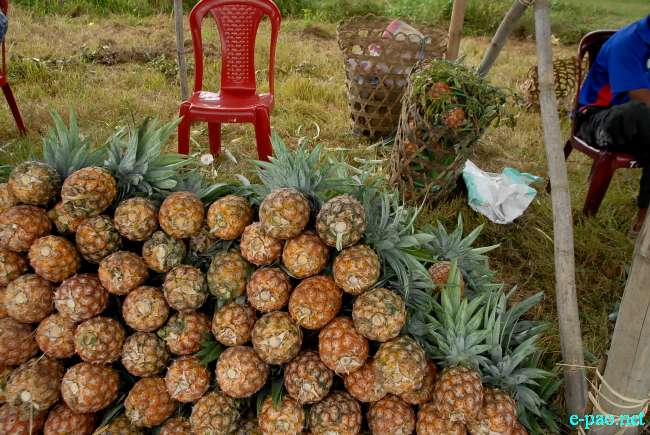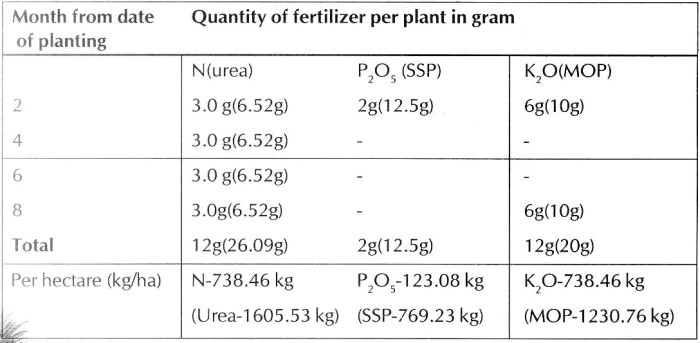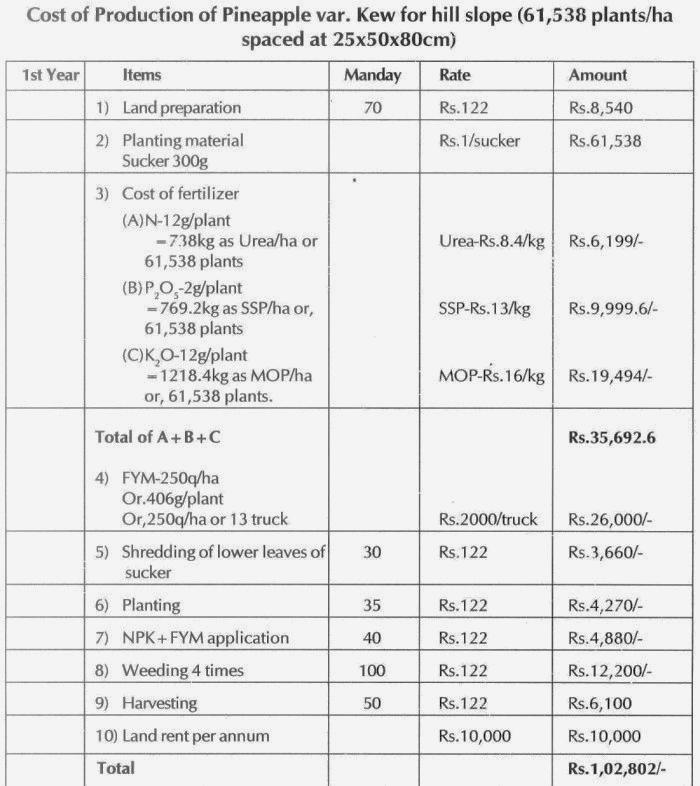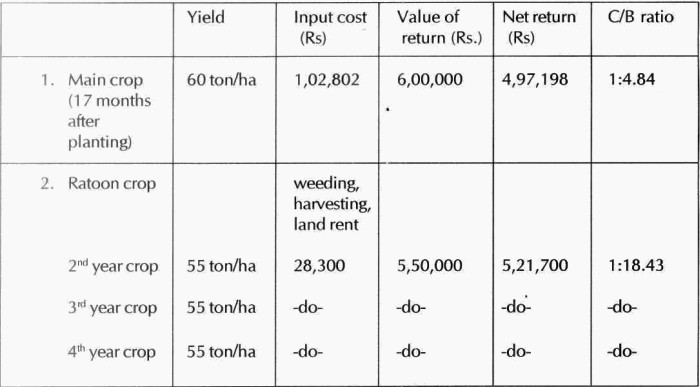Economic Production Of Kew Pineapple In Manipur
Prof. W Ingo Meitei, H Jayalaxmi, L Sophia *

4th State Level Pineapple Festival, 2011 at Khuman Lampak complex on September 03 2011
The Pineapple (Anannas comosus (L). Merr. Family (Bromeliaceae) is a pan-tropical plant. More than half of the world production currently takes place in the South East Asia, more than a quarter in America and the remainder is split up between the Carribean, Africa and Oceanic.
Manipur with its favourable climate and soil type is suitable for cultivation of pineapple. The importance and demand of this crop had increased with the establishment of many canning industries during the last 1-2 decades. Inspite of its great potentialities in the state, the present position of pineapple shows a dismal picture particularly in per hectare yield.
The low yield of pineapple may be due to the lack of adoption of new technology such as new improved cultivation techniques including high density planting, judicious use of fertilizers,weed control and continuous cropping without improving the system of cultivation.
There are vast areas of foothills of Manipur (more than 2,00,000 ha) which are quite suited for cultivation of pineapple and if properly utilised can be brought under cultivation. Hence, Manipur will be a leading pineapple producing state of the country, thereby, improving the socio economic condition of the farmers of Manipur.
Farmers of Manipur are generally not adopting high yielding variety of pineapple. Kew or Giant kew (Syn. Cayenne) is the most widely grown high yielding cultivar for commercial production. Average fruit weight is about 2.5 kg with almost cylindrical shape with greater diameter near the base of the fruit.
Because of desirable shape, juicyness and larger size, this variety is very suitable for canning purpose which is widely expanding and getting momentum in the last one or two decades. Therefore, for profitable production variety Kew should be introduced in new areas of Manipur.
Variety:
Land Preparation:
In order to adopt high density planting for increasing yield the soil must be loosened to a depth of at least 35 cm. All the deep rooted shrubs and rhizomes of thatch grass need to be properly removed before planting the pineapple. The soil must be clean and in particular free of perennial weeds that are subsequently difficult to eliminate. Since, most of the new areas where cultivation of pineapple is to be extended are foothills and hill slopes, risks of soil erosion is very high in such terrain.
Generally, pineapple is cultivated in Manipur by adopting towards the slope planting with wider spacing (more than 1 m x 1 m i.e., plant to plant and row to row).under such condition the soil are highly exposed to all types of attack by the rains and other environmental factors if left open for along time The soil nutrients are leached and washed down, thus productivity of the soil is decreased tremendously.
In order to escape the ill effects of soil erosion the land preparation should be completed during the dry periods preferably November to Febraury. Therefore, for maintaining sustainable cultivation in the field adoption of right system of planting should be taken into consideration. Planting on contour line should be adopted to reduce soil erosion.
Preparation of planting materials:
Pineapples are propagated vegetatively, by sucker, slips, hapas and crown (description in structure below). All the above forms of planting material have considerable resistance to desiccation and may be stored for several weeks before planting, in order to facilitate and homogenize growth of shoots after planting, it is often recommended to trim the more or less dried out leaflets at the base that form a barrier between the root primordiums and the soil.
Spacing: The most common planting density used for Kew are:
- Numbers of lines per row-2
- Distance between plants in the same line -25(cm)
- Distance between Iines-50(cm)
- Distance between rows -80 (cm)
In other words- 25cmx50cmx80cm - Numbers of plant per hectare -61,538
- Orientation of the rows on the contour lines should be against the slope.
- It almost prevents the development of weeds in the area that is covered.
- It reduces evaporation and thus delayed drying out of the soil. Soil water profile is more homogenous. It also reduces the risk of temporary saturation.
- It protects the structure of soil and thus limits unfavourable changes linked to the kinetic effect of rainfall. Thus ensures much more satisfactory development of root system especially in the first 15 cm of the soil and also enhance root activity.
- It reduces the leaching of nutrients.
- It reduces daily temperature variation by limiting night time cooling of the soil due to radiation and also daytime heating of the soil, but mean temperature is slightly increased.
POLYTHENE MULCHING OF PINEAPPLE
Material required:
0.1 mm thick or 100 micron, Coverage can be 60 - 90 %, Spacing - 25 x 50 x 80 cm (total - 2.3 m), 1 m width x 3437 m (running metres) per ha at 65% coverage, 1 m x 4348 running m/ha for 85% coverage. It will cover up for main crop, 1st and 2nd ratoon and may last for 5 years. Stray catties or buffaloes should not be allowed to enter the field as they may destroy the laid polymulching.
Nutrition: Organic nutrient i.e., farm yard manures plays an extremely important role during the period when the soil is uncovered and thus exposed to attack by the rainfall, wind, sunshine and temperature etc. good application of organic matter should be always be carried out for maintaining proper physical and chemical texture of the soil, application of 250q/ hectare (2.5kg/sq m) of FYM is sufficient for maintaining the main crop, 1st and 2nd ratoon is recommended for pineapple field preferably during the land preparation. Such application will have beneficial effect of sustainability of soil in long term basis.
Under Manipur condition application of 12g N; 2g P205 and 12g K20 per plant is recommended for increasing yield of pineapple (main crop) and 10g N per plant for the ratoon crop ( each year).
Method of split application- Split application of fertilizers particularly N and K are frequently recommended and they have to be dissolved before they can be assimilated. The mode of application of fertilizers should be as follows.

Application of Fertilizers - N, P2O5 & K20 at 2 and 5 months may be applied to the soil around the plant without much difficulty, however, at 8 and 11 months after planting, specialy for the application of nitrogen, fertilizers due to leaf development, it will be difficult to applied fertilizers at the soils and should be placed in the axis of the old leaves that are unlikely to suffer from burning.
Mannual application of fertilizers as base takes approximately 8 days by one individual whereas, by axils application it will take about 3 days. 315 ml of ethrel (50ppm) with 2461 Its of water and 50 kg urea (2%) will be required for spraying a plantation spaced at 25x50x80 cm or 61,538 plants per hectare.
This application gives uniform flowering and fruit production and produced flowers 94.77 days earlier than that of the control and should be applied at 35 leaf stage of crop. About 40 ml of water will be required to cover one plant. All the application of growth regulation should be made when the stomata remain open i.e., during the night time.
Harvesting
In Manipur the main harvest of pineapple for Kew variety is from August to October. The fruit for the local market should be picked up in 1/4 of fruit turn yellow. Harvesting should be done with a sharp knife severing the fruit stalk with a clean cut and retaining about 5 cm of the stalk.
Highest yield of pineapple of 60 tones per hectare may be obtained from main crop and 61 - 65 tonnes may be expected each year for 1st and 2nd ratoon crops respectively. The common practice in the leading pineapple producing centres is to renew the plantation once in every five years. Continues cropping for many years together in the same field will cause yield reduction.
RATOON
The first ratoon crop is obtained by leaving the sucker to develop on the mother plants after the first fruit has been harvested. Under natural condition the root system more or less disappears when the main crop is harvested.
The plant cannot provide sufficient anchorage in the soil due to it and subsequently falls over on its side onto the ground. Suckers often grow in ideal position to ensure the growth of a new, independent root system and so the process goes on. The aim of ratoon management is to prevent the plant from falling due to poor root system, to protect the plant for quality production and to produce marketable fruit.
The advantage of first and subsequent ratoon crops is their reduced cost;. All work connected with planting is eliminated. However the yield obtained in the first and second ratoon are satisfactory without too great increase in the cost of the main crop. The period of soil occupation for the ratoon crop is generally shorter than that of the main crop. After application of N fertilizer proper earthing up operation should be carried out.
Stagerring production
The time taken from planting to harvesting depends on the type of planting material and cultivars used: sucker, ground sucker, hapas, crowns, slips
- Suckers-time taken from planting to harvesting is 15-18 months.
- Slips -16-20 months from planting to harvesting
- Crowns -18-24 months from planting to harvesting
Such practice of planting of different types of planting materials in order to produce fruits at different periods is known as staggering production of pineapple. The different types of planting material should be planted on different blocks and should not be mixed so as to conveniently carry out the cultural practices. The aim of staggering production is to make available pineapple fruit throughout the year and for earning sustainable income of the growers.
Summary of economics for the cultivation of Kew pineapple
Fruit yield from cultivation of 1 ha area is 60tonnes, a grower can earn upto Rs.2,30,000. Since the fruits are perishable in nature one can opt for high value conversion i.e., conversion to fruit juice can give Rs.4,95,920 and from squashes Rs. 16,28,000 from 1 ha.


* Prof. W Ingo Meitei, H Jayalaxmi, L Sophia wrote this article as part of the Souvenir for "4th state level-Manipur Pineapple festival 2011"
The writers are associated with Department of Horticulture at Central Agricultural University (CAU), Imphal
This article was posted on September 22, 2011.
* Comments posted by users in this discussion thread and other parts of this site are opinions of the individuals posting them (whose user ID is displayed alongside) and not the views of e-pao.net. We strongly recommend that users exercise responsibility, sensitivity and caution over language while writing your opinions which will be seen and read by other users. Please read a complete Guideline on using comments on this website.








